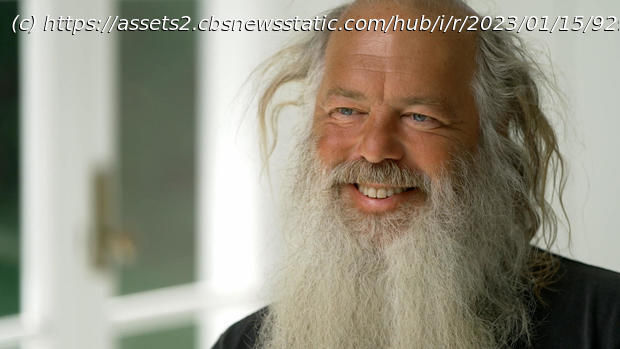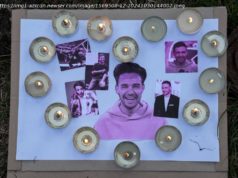As an NYU college student, Rick Rubin launched Def Jam Recordings some 40 years ago and has been a hitmaker ever since. Anderson Cooper interviews the music producer about his unique approach.
Rick Rubin is one of the most talented music producers of his generation and certainly one of the most interesting. At 59, he’s worked with just about every top recording artist across all genres. In an industry geared toward churning out hits, Rubin’s focus is on feelings and helping artists get in touch with their musical selves. If that sounds somewhat mystical, that’s just fine with Rick Rubin. After all, his storied studio in California is named Shangri-La and he’s been called the Guru by more than a few of the artists he’s worked with. In fact, before our interview even began, Rubin crossed his legs, closed his eyes, and then suggested we do the same.
Rick Rubin: Should we spend two minutes eyes closed meditating before we start?
Anderson Cooper: Sure.
Rick Rubin: Just to, like, really get here?
Anderson Cooper: Sure. Okay.
Rick Rubin: Let’s do that.
Anderson Cooper: That’s a first.
Rick Rubin: Nice.
Anderson Cooper: Yea. Does meditation help you creatively?
Rick Rubin: It clears the distractions. Say the distractions can get in the way with a direct connection to the creative force.
Rick Rubin is definitely in tune with his creative force. Over the last four decades he’s produced albums and songs with more than 120 artists.
He’s helped launch careers – LL Cool J and Public Enemy among them. And he’s often the go-to guy for artists at the top of their game, like Adele.
But exactly what he does, and how, is difficult to describe.
Anderson Cooper: Do you play instruments?
Rick Rubin: Barely.
Anderson Cooper: Do you know how to work a soundboard?
Rick Rubin: No. I have no technical ability. And I know nothing about music.
Anderson Cooper: (LAUGH) You must know something.
Rick Rubin: Well, I know what I like and what I don’t like. And I’m, I’m decisive about what I like and what I don’t like.
Anderson Cooper: So what are you being paid for?
Rick Rubin: The confidence that I have in my taste and my ability to express what I feel has proven helpful for artists.
Artists are eager to make the pilgrimage to Shangri-La Studios in Malibu to work with Rubin.
Anderson Cooper: How many studios do you have here?
Rick Rubin: There’s the main control room here with the live room.
The place is minimalist, to say the least. There’s no mirrors, no TV’s, no signs of Rick Rubin’s extraordinary success.
Anderson Cooper: I’d never been in a recording studio where there’s not gold records and Grammys. Do you have, like, a tiny ego room somewhere?
Rick Rubin: I don’t. I u– I used to send them all to my parents (LAUGH). And I don’t know where they are now. It’s a distraction. If you start thinking about doing something to achieve that, then you’re not focused on this- making this beautiful thing. It undermines the purity of the project.
Rick Rubin: We’re going back to the key and we’re going back to the tempo.
Rubin has referred to himself as a reducer, instead of a producer.
Rick Rubin: I like the idea of getting the point across with the least amount of information possible.
Anderson Cooper: And that’s what you’re doing in a recording studio? You’re listening to music, to sound, and trying to strip it?
Rick Rubin: Just to see what’s- what is actually necessary.






